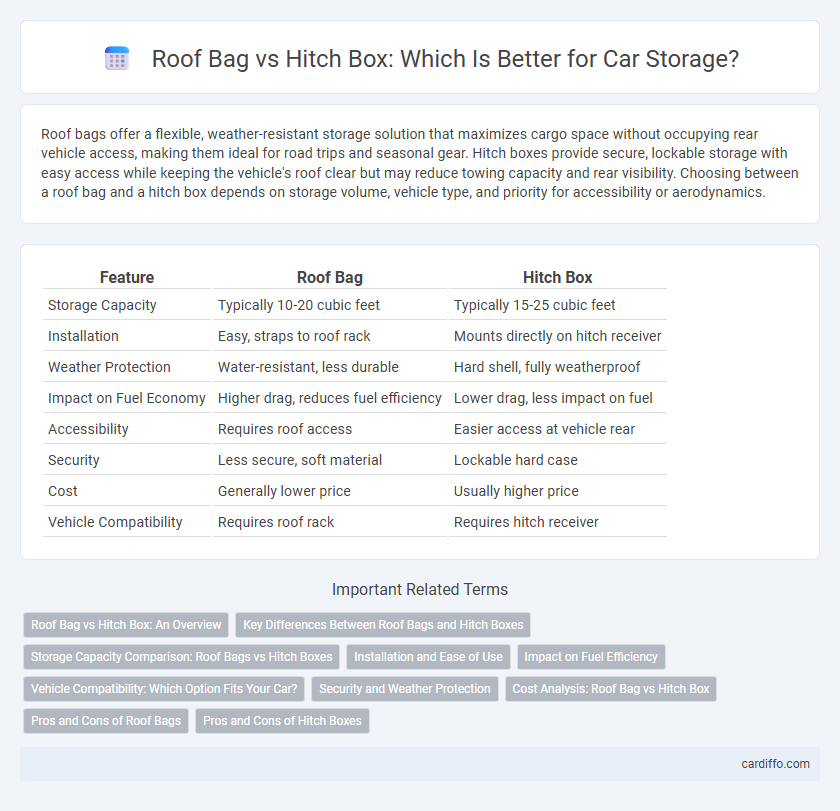Roof bags offer a flexible, weather-resistant storage solution that maximizes cargo space without occupying rear vehicle access, making them ideal for road trips and seasonal gear. Hitch boxes provide secure, lockable storage with easy access while keeping the vehicle's roof clear but may reduce towing capacity and rear visibility. Choosing between a roof bag and a hitch box depends on storage volume, vehicle type, and priority for accessibility or aerodynamics.
Table of Comparison
| Feature | Roof Bag | Hitch Box |
|---|---|---|
| Storage Capacity | Typically 10-20 cubic feet | Typically 15-25 cubic feet |
| Installation | Easy, straps to roof rack | Mounts directly on hitch receiver |
| Weather Protection | Water-resistant, less durable | Hard shell, fully weatherproof |
| Impact on Fuel Economy | Higher drag, reduces fuel efficiency | Lower drag, less impact on fuel |
| Accessibility | Requires roof access | Easier access at vehicle rear |
| Security | Less secure, soft material | Lockable hard case |
| Cost | Generally lower price | Usually higher price |
| Vehicle Compatibility | Requires roof rack | Requires hitch receiver |
Roof Bag vs Hitch Box: An Overview
Roof bags offer flexible, weather-resistant storage ideal for occasional users needing extra space without permanent installation, while hitch boxes provide sturdy, lockable storage attached to a vehicle's hitch receiver, suitable for heavy or bulky items. Roof bags typically weigh less and fold flat for easy storage when not in use, whereas hitch boxes require a hitch mount and add aerodynamic drag but enhance security and durability. Choosing between roof bag vs hitch box depends on vehicle compatibility, storage capacity needs, and frequency of use.
Key Differences Between Roof Bags and Hitch Boxes
Roof bags offer flexible, weather-resistant storage mounted on vehicle roofs, ideal for lightweight and bulky items, while hitch boxes provide sturdy, lockable storage secured to a trailer hitch, better suited for heavier gear and security-conscious users. Roof bags typically weigh less and affect vehicle aerodynamics more, potentially reducing fuel efficiency, whereas hitch boxes maintain a lower profile and have minimal impact on gas mileage. Maintenance-wise, roof bags require careful waterproofing, and hitch boxes need periodic hitch hardware inspection to ensure safe transport.
Storage Capacity Comparison: Roof Bags vs Hitch Boxes
Roof bags typically offer flexible storage capacity ranging from 10 to 20 cubic feet, ideal for lightweight and irregularly shaped items. Hitch boxes generally provide more rigid, secure storage solutions with capacities between 8 to 15 cubic feet, often better suited for heavy or bulky gear. Choosing between roof bags and hitch boxes depends on the type of cargo and the need for weather resistance, security, and ease of access.
Installation and Ease of Use
Roof bags offer straightforward installation by simply securing straps around roof rails, making them lightweight and easy to remove, ideal for occasional use. Hitch boxes require mounting onto a vehicle's hitch receiver, providing a more stable and secure storage solution but involving a slightly more complex installation process. Both options enhance storage capabilities, with roof bags excelling in portability and hitch boxes in durability and ease of access.
Impact on Fuel Efficiency
Roof bags increase aerodynamic drag due to their placement on top of the vehicle, which typically results in a noticeable decrease in fuel efficiency, especially at higher speeds. Hitch boxes, mounted lower and closer to the vehicle's rear, create less wind resistance, making them a more fuel-efficient storage solution for long trips. Studies indicate that roof storage can reduce fuel economy by up to 25%, while hitch-mounted cargo carriers generally cause less than a 10% reduction.
Vehicle Compatibility: Which Option Fits Your Car?
Roof bags offer versatile compatibility with most vehicles by attaching to standard roof racks or crossbars, ideal for cars, SUVs, and trucks without a hitch receiver. Hitch boxes require a compatible trailer hitch, typically class I or higher, limiting use to vehicles equipped with a tow hitch, often SUVs, trucks, and some sedans. Evaluating your vehicle's roof rack presence or hitch receiver class is essential to determine whether a roof bag or hitch box suits your storage needs and ensures safe, secure transport.
Security and Weather Protection
Roof bags provide moderate weather protection with waterproof materials but are generally less secure due to their soft structure and vulnerability to theft. Hitch boxes offer superior security with hard shells and lockable compartments, effectively deterring theft and safeguarding contents. Both options protect against weather damage, but hitch boxes excel in durability and security during harsh conditions.
Cost Analysis: Roof Bag vs Hitch Box
Roof bags generally cost between $40 and $100, offering an affordable storage solution for occasional use, while hitch boxes range from $150 to $400, representing a higher upfront investment but enhanced durability and security. Roof bags may incur additional costs due to wear and tear or slower loading times, whereas hitch boxes provide long-term cost efficiency through robust construction and easier access. Evaluating total ownership expenses, including installation, maintenance, and potential damage, is crucial when choosing between roof bags and hitch boxes.
Pros and Cons of Roof Bags
Roof bags offer flexible and expandable storage options, ideal for transporting bulky or irregularly shaped items without significantly impacting vehicle aerodynamics. They are lightweight and easy to install or remove, providing convenience for short trips, but they may lack the durability and weather resistance of hard hitch boxes. Roof bags can increase wind resistance and noise during driving, and they often require careful waterproofing to protect contents from rain and debris.
Pros and Cons of Hitch Boxes
Hitch boxes offer the advantage of easy access without lifting items overhead, making loading and unloading more convenient compared to roof bags. They typically provide a more secure and weather-resistant storage solution, protecting belongings from rain, snow, and road debris. However, hitch boxes may reduce rear visibility and can interfere with towing or parking, requiring consideration of vehicle compatibility and clearance limitations.
roof bag vs hitch box Infographic

 cardiffo.com
cardiffo.com